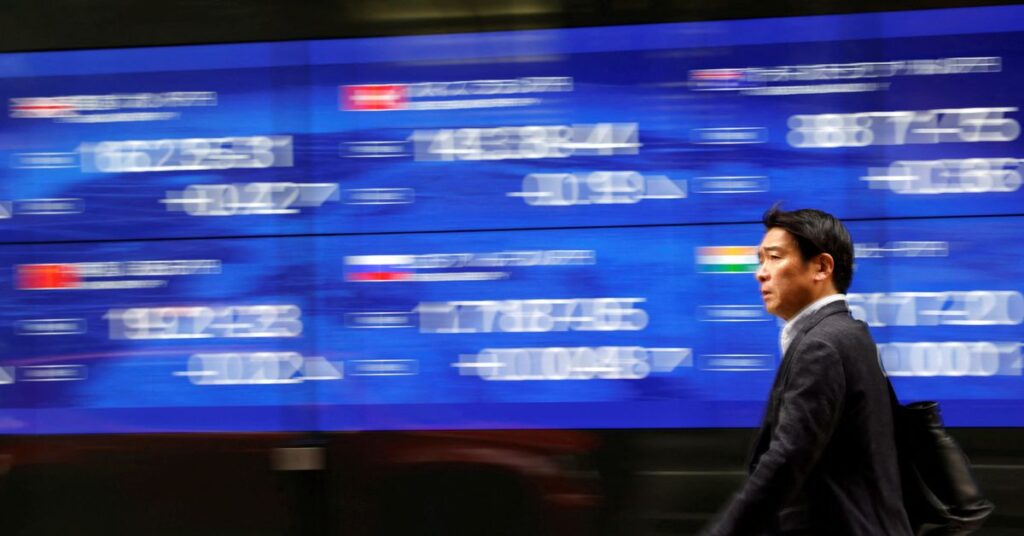SYDNEY, Sept 25 (Reuters) – Asian shares fell on Monday, dragged by China, after central banks last week reinforced the message that interest rates would stay higher for longer, while investors braced for inflation data from the U.S. and Europe.
The yen was jittery near the closely watched 150 per dollar level amid intervention fears, after the Bank of Japan made no change to its dovish monetary policy. Governor Kazuo Ueda is giving a speech and taking questions from 0130 GMT.
Europe is set for a subdued open, with EUROSTOXX 50 futures off 0.3%. S&P 500 futures , however, rose 0.3% while Nasdaq futures gained 0.4%, after Hollywood’s writers union reached a preliminary labor agreement with major studios.
In Asia, MSCI’s broadest index of Asia-Pacific shares outside Japan (.MIAPJ0000PUS) dropped 0.5%, edging back to a 10-month low plumbed just last week. Japan’s Nikkei (.N225), on the other hand, rose 0.9%, as investors bought beaten-down shares.
Chinese shares fell after a rebound on Friday, as property concerns and pre-holiday caution weighed. The blue chips index (.CSI300) eased 0.5% and Hong Kong’s Hang Seng index (.HSI) slumped 1.2% as Chinese property developers dived more than 3%.
Evergrande, the embattled developer, said late on Sunday it was unable to issue new debt due to an ongoing investigation into its main domestic subsidiary, Hengda Real Estate Group Co Ltd, the latest trouble in firming up a debt restructuring plan.
S&P on Monday lowered its forecast for China’s economic growth to 4.8% in 2023 from 5.2%, and to 4.4% in 2024 from 4.8%, saying the fiscal and monetary easing had remained limited.
“Policymakers’ emphasis on containing leverage and financial risks has increased the bar for macro stimulus,” said Louis Kuijs, Asia-Pacific chief economist.
Markets will be looking for clues on whether China’s economy is regaining traction, with a week-long national holiday set to begin on Friday that will be a key test for consumer spending.
The big test in the week ahead would be the manufacturing and services PMIs on Saturday.
BOND ROUT
Bond investors were still smarting from the U.S. Federal Reserve’s more hawkish rate projections, which caught markets by surprise. Coupled with the recent resilience in the U.S. economy, markets now see about a split chance that the Fed would resume hiking in December, while drastically scaling back rate cut expectations to just 65 basis points next year.
U.S. central bank officials will be out in force this week, starting with Minneapolis Fed President Neel Kashkari on Monday.
“What’s driven the move this year is the acceptance that inflation shock isn’t transitory, but is going to require restrictive monetary policy for much longer than we first thought,” said Andrew Lilley, chief rates strategist at Barrenjoey.
“For bonds to rally globally, we’re going to need a coordinated rate cutting cycle, particularly from the Fed. Personally I don’t see the Fed cutting in 2024, so I don’t think that 2024 will be a particularly good year for bonds either.”
Ten-year Treasury yields inched up 3 basis points to 4.4662% on Monday, after retreating from a 16-year high of 4.508% on Friday.
Two-year yields were little changed at 5.1162%, having fallen from a 17-year top of 5.2020% hit last week.
Much will depend on U.S. data. In a sign of slowing growth, U.S. business activity was basically at a standstill in September, with the vast services sector essentially idling at the slowest pace since February.
The Fed’s favoured inflation gauge, the core Personal Consumption Expenditures Price Index, is expected to show a 3.9% annual increase in August, easing from 4.2%. Other U.S. data in the week includes final Q2 GDP.
Euro zone preliminary inflation figures for September are due on Friday and are expected to ease to 4.5% annually from 5.2% in August. Markets are expecting that the European Central Bank is done hiking.
In the broader currency market, the dollar was on the front foot, extending its gains from last week. The yen last traded at 148.37 per dollar, after touching a fresh 10-month low of 148.49 earlier in the day.
Oil prices resumed their climb on Monday, not far from their 10-month highs. Brent crude futures rose 0.6% to $93.79 per barrel. U.S. West Texas Intermediate crude futures were also up 0.5% at $90.44.
Gold was 0.1% lower at $1,922.76 per ounce.
Reporting by Stella Qiu; Editing by Himani Sarkar and Jacqueline Wong
: .


